Dementia: Prevalence, Impact and Nursing Interventions in Australia
VerifiedAdded on 2023/04/17
|7
|1309
|126
Essay
AI Summary
This essay provides a detailed overview of dementia in Australia, highlighting its prevalence, symptoms, and social, mental, physical, and emotional consequences. It emphasizes the healthcare significance of dementia, discussing its impact on patients' daily lives and overall wellbeing. The essay also explores management and treatment strategies, including holistic assessment, cognitive exercises, communication techniques, and the importance of group activities. Furthermore, it underscores the role of nursing professionals in providing effective dementia care through building strong relationships, offering informative training sessions, and ensuring accurate medication administration. The essay concludes by reiterating the importance of addressing dementia as a crucial healthcare concern and implementing effective strategies to manage the condition in elderly patients. Desklib offers this and many other solved assignments to aid students.
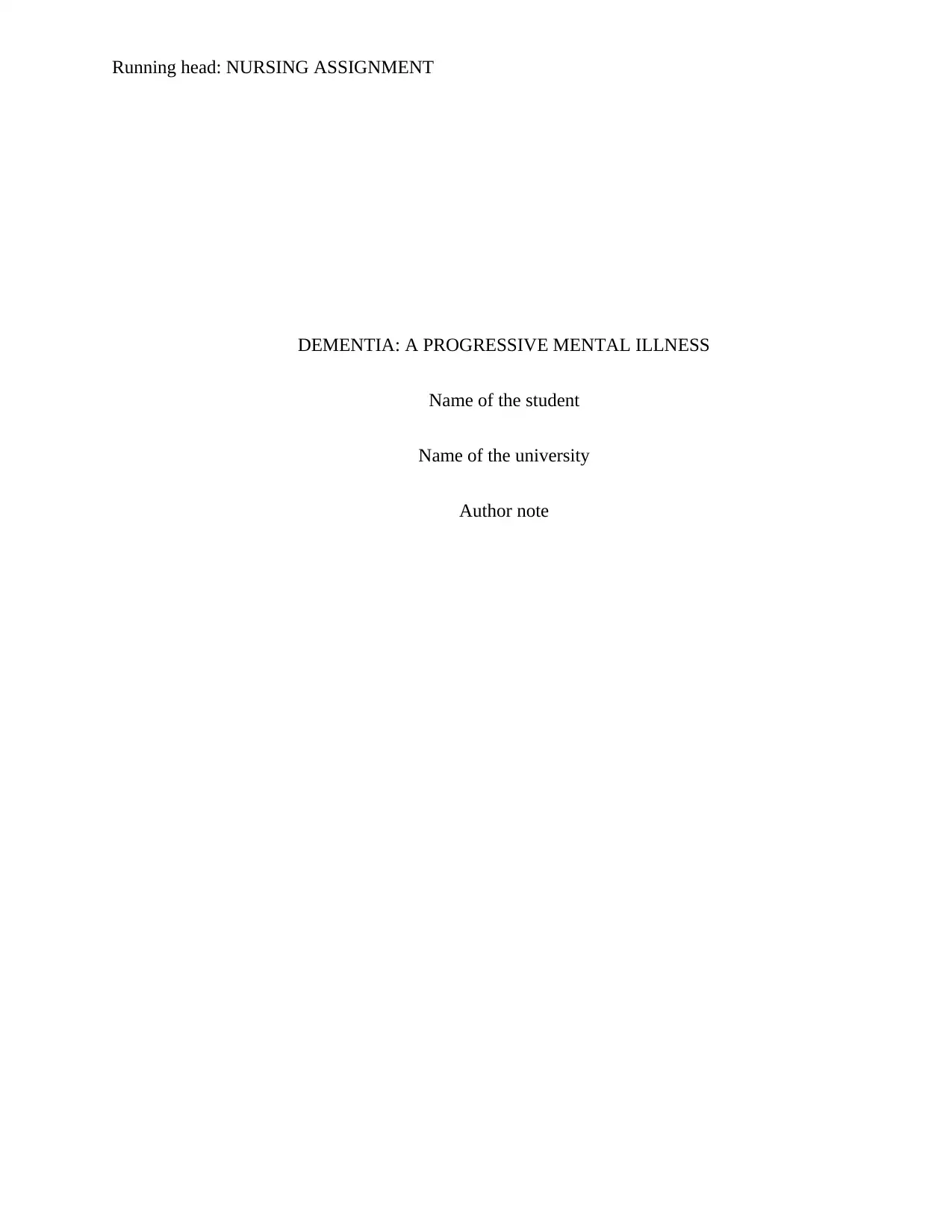
Running head: NURSING ASSIGNMENT
DEMENTIA: A PROGRESSIVE MENTAL ILLNESS
Name of the student
Name of the university
Author note
DEMENTIA: A PROGRESSIVE MENTAL ILLNESS
Name of the student
Name of the university
Author note
Paraphrase This Document
Need a fresh take? Get an instant paraphrase of this document with our AI Paraphraser
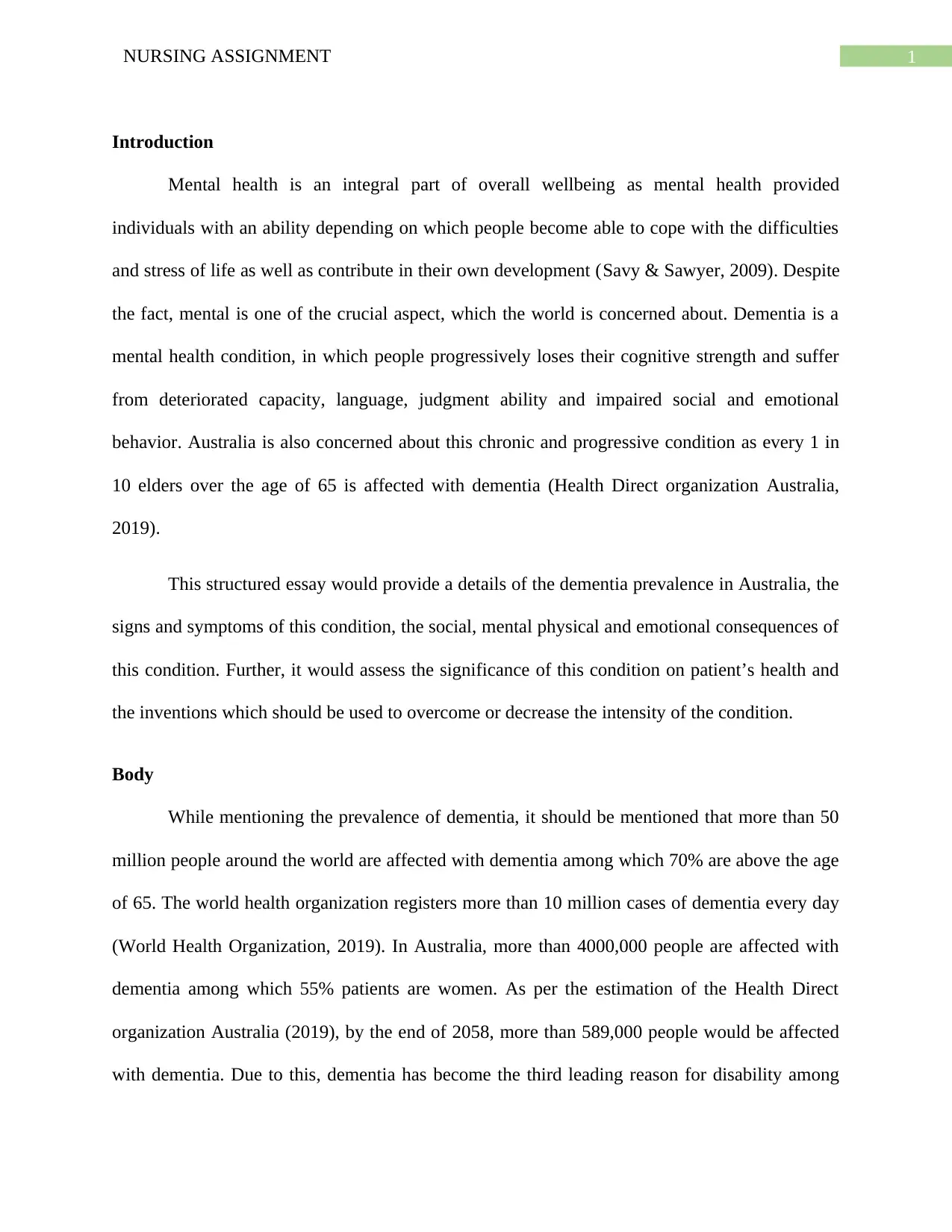
1NURSING ASSIGNMENT
Introduction
Mental health is an integral part of overall wellbeing as mental health provided
individuals with an ability depending on which people become able to cope with the difficulties
and stress of life as well as contribute in their own development (Savy & Sawyer, 2009). Despite
the fact, mental is one of the crucial aspect, which the world is concerned about. Dementia is a
mental health condition, in which people progressively loses their cognitive strength and suffer
from deteriorated capacity, language, judgment ability and impaired social and emotional
behavior. Australia is also concerned about this chronic and progressive condition as every 1 in
10 elders over the age of 65 is affected with dementia (Health Direct organization Australia,
2019).
This structured essay would provide a details of the dementia prevalence in Australia, the
signs and symptoms of this condition, the social, mental physical and emotional consequences of
this condition. Further, it would assess the significance of this condition on patient’s health and
the inventions which should be used to overcome or decrease the intensity of the condition.
Body
While mentioning the prevalence of dementia, it should be mentioned that more than 50
million people around the world are affected with dementia among which 70% are above the age
of 65. The world health organization registers more than 10 million cases of dementia every day
(World Health Organization, 2019). In Australia, more than 4000,000 people are affected with
dementia among which 55% patients are women. As per the estimation of the Health Direct
organization Australia (2019), by the end of 2058, more than 589,000 people would be affected
with dementia. Due to this, dementia has become the third leading reason for disability among
Introduction
Mental health is an integral part of overall wellbeing as mental health provided
individuals with an ability depending on which people become able to cope with the difficulties
and stress of life as well as contribute in their own development (Savy & Sawyer, 2009). Despite
the fact, mental is one of the crucial aspect, which the world is concerned about. Dementia is a
mental health condition, in which people progressively loses their cognitive strength and suffer
from deteriorated capacity, language, judgment ability and impaired social and emotional
behavior. Australia is also concerned about this chronic and progressive condition as every 1 in
10 elders over the age of 65 is affected with dementia (Health Direct organization Australia,
2019).
This structured essay would provide a details of the dementia prevalence in Australia, the
signs and symptoms of this condition, the social, mental physical and emotional consequences of
this condition. Further, it would assess the significance of this condition on patient’s health and
the inventions which should be used to overcome or decrease the intensity of the condition.
Body
While mentioning the prevalence of dementia, it should be mentioned that more than 50
million people around the world are affected with dementia among which 70% are above the age
of 65. The world health organization registers more than 10 million cases of dementia every day
(World Health Organization, 2019). In Australia, more than 4000,000 people are affected with
dementia among which 55% patients are women. As per the estimation of the Health Direct
organization Australia (2019), by the end of 2058, more than 589,000 people would be affected
with dementia. Due to this, dementia has become the third leading reason for disability among
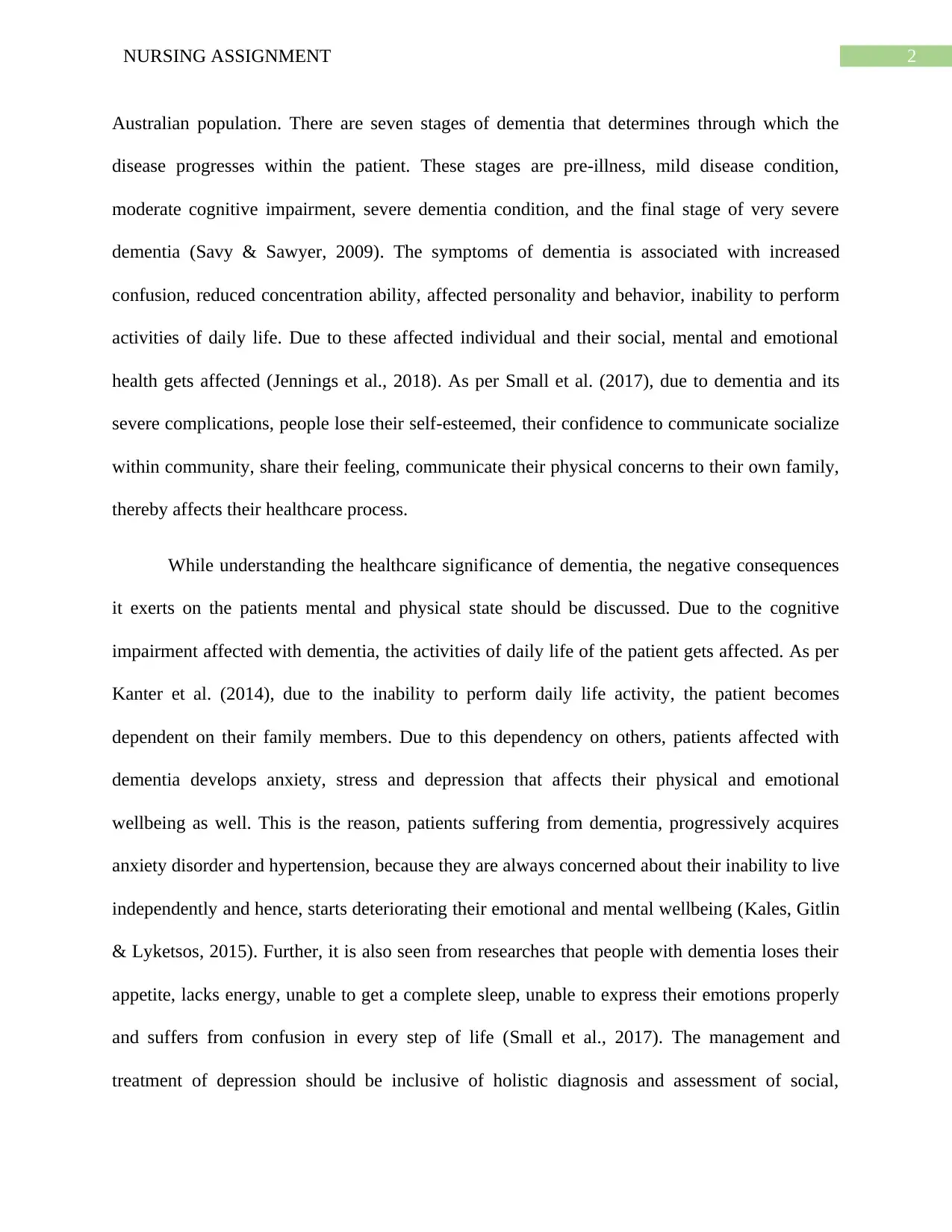
2NURSING ASSIGNMENT
Australian population. There are seven stages of dementia that determines through which the
disease progresses within the patient. These stages are pre-illness, mild disease condition,
moderate cognitive impairment, severe dementia condition, and the final stage of very severe
dementia (Savy & Sawyer, 2009). The symptoms of dementia is associated with increased
confusion, reduced concentration ability, affected personality and behavior, inability to perform
activities of daily life. Due to these affected individual and their social, mental and emotional
health gets affected (Jennings et al., 2018). As per Small et al. (2017), due to dementia and its
severe complications, people lose their self-esteemed, their confidence to communicate socialize
within community, share their feeling, communicate their physical concerns to their own family,
thereby affects their healthcare process.
While understanding the healthcare significance of dementia, the negative consequences
it exerts on the patients mental and physical state should be discussed. Due to the cognitive
impairment affected with dementia, the activities of daily life of the patient gets affected. As per
Kanter et al. (2014), due to the inability to perform daily life activity, the patient becomes
dependent on their family members. Due to this dependency on others, patients affected with
dementia develops anxiety, stress and depression that affects their physical and emotional
wellbeing as well. This is the reason, patients suffering from dementia, progressively acquires
anxiety disorder and hypertension, because they are always concerned about their inability to live
independently and hence, starts deteriorating their emotional and mental wellbeing (Kales, Gitlin
& Lyketsos, 2015). Further, it is also seen from researches that people with dementia loses their
appetite, lacks energy, unable to get a complete sleep, unable to express their emotions properly
and suffers from confusion in every step of life (Small et al., 2017). The management and
treatment of depression should be inclusive of holistic diagnosis and assessment of social,
Australian population. There are seven stages of dementia that determines through which the
disease progresses within the patient. These stages are pre-illness, mild disease condition,
moderate cognitive impairment, severe dementia condition, and the final stage of very severe
dementia (Savy & Sawyer, 2009). The symptoms of dementia is associated with increased
confusion, reduced concentration ability, affected personality and behavior, inability to perform
activities of daily life. Due to these affected individual and their social, mental and emotional
health gets affected (Jennings et al., 2018). As per Small et al. (2017), due to dementia and its
severe complications, people lose their self-esteemed, their confidence to communicate socialize
within community, share their feeling, communicate their physical concerns to their own family,
thereby affects their healthcare process.
While understanding the healthcare significance of dementia, the negative consequences
it exerts on the patients mental and physical state should be discussed. Due to the cognitive
impairment affected with dementia, the activities of daily life of the patient gets affected. As per
Kanter et al. (2014), due to the inability to perform daily life activity, the patient becomes
dependent on their family members. Due to this dependency on others, patients affected with
dementia develops anxiety, stress and depression that affects their physical and emotional
wellbeing as well. This is the reason, patients suffering from dementia, progressively acquires
anxiety disorder and hypertension, because they are always concerned about their inability to live
independently and hence, starts deteriorating their emotional and mental wellbeing (Kales, Gitlin
& Lyketsos, 2015). Further, it is also seen from researches that people with dementia loses their
appetite, lacks energy, unable to get a complete sleep, unable to express their emotions properly
and suffers from confusion in every step of life (Small et al., 2017). The management and
treatment of depression should be inclusive of holistic diagnosis and assessment of social,
⊘ This is a preview!⊘
Do you want full access?
Subscribe today to unlock all pages.

Trusted by 1+ million students worldwide
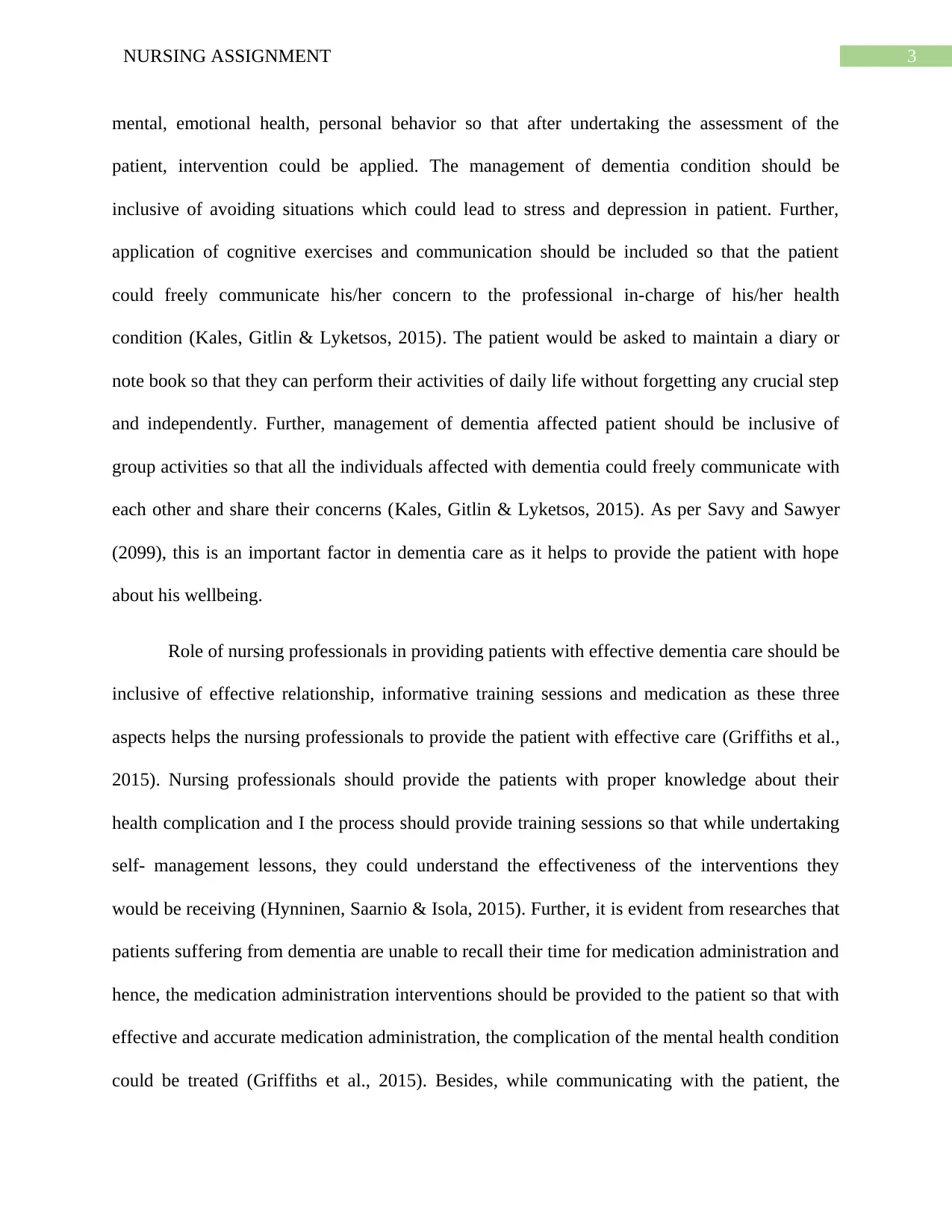
3NURSING ASSIGNMENT
mental, emotional health, personal behavior so that after undertaking the assessment of the
patient, intervention could be applied. The management of dementia condition should be
inclusive of avoiding situations which could lead to stress and depression in patient. Further,
application of cognitive exercises and communication should be included so that the patient
could freely communicate his/her concern to the professional in-charge of his/her health
condition (Kales, Gitlin & Lyketsos, 2015). The patient would be asked to maintain a diary or
note book so that they can perform their activities of daily life without forgetting any crucial step
and independently. Further, management of dementia affected patient should be inclusive of
group activities so that all the individuals affected with dementia could freely communicate with
each other and share their concerns (Kales, Gitlin & Lyketsos, 2015). As per Savy and Sawyer
(2099), this is an important factor in dementia care as it helps to provide the patient with hope
about his wellbeing.
Role of nursing professionals in providing patients with effective dementia care should be
inclusive of effective relationship, informative training sessions and medication as these three
aspects helps the nursing professionals to provide the patient with effective care (Griffiths et al.,
2015). Nursing professionals should provide the patients with proper knowledge about their
health complication and I the process should provide training sessions so that while undertaking
self- management lessons, they could understand the effectiveness of the interventions they
would be receiving (Hynninen, Saarnio & Isola, 2015). Further, it is evident from researches that
patients suffering from dementia are unable to recall their time for medication administration and
hence, the medication administration interventions should be provided to the patient so that with
effective and accurate medication administration, the complication of the mental health condition
could be treated (Griffiths et al., 2015). Besides, while communicating with the patient, the
mental, emotional health, personal behavior so that after undertaking the assessment of the
patient, intervention could be applied. The management of dementia condition should be
inclusive of avoiding situations which could lead to stress and depression in patient. Further,
application of cognitive exercises and communication should be included so that the patient
could freely communicate his/her concern to the professional in-charge of his/her health
condition (Kales, Gitlin & Lyketsos, 2015). The patient would be asked to maintain a diary or
note book so that they can perform their activities of daily life without forgetting any crucial step
and independently. Further, management of dementia affected patient should be inclusive of
group activities so that all the individuals affected with dementia could freely communicate with
each other and share their concerns (Kales, Gitlin & Lyketsos, 2015). As per Savy and Sawyer
(2099), this is an important factor in dementia care as it helps to provide the patient with hope
about his wellbeing.
Role of nursing professionals in providing patients with effective dementia care should be
inclusive of effective relationship, informative training sessions and medication as these three
aspects helps the nursing professionals to provide the patient with effective care (Griffiths et al.,
2015). Nursing professionals should provide the patients with proper knowledge about their
health complication and I the process should provide training sessions so that while undertaking
self- management lessons, they could understand the effectiveness of the interventions they
would be receiving (Hynninen, Saarnio & Isola, 2015). Further, it is evident from researches that
patients suffering from dementia are unable to recall their time for medication administration and
hence, the medication administration interventions should be provided to the patient so that with
effective and accurate medication administration, the complication of the mental health condition
could be treated (Griffiths et al., 2015). Besides, while communicating with the patient, the
Paraphrase This Document
Need a fresh take? Get an instant paraphrase of this document with our AI Paraphraser
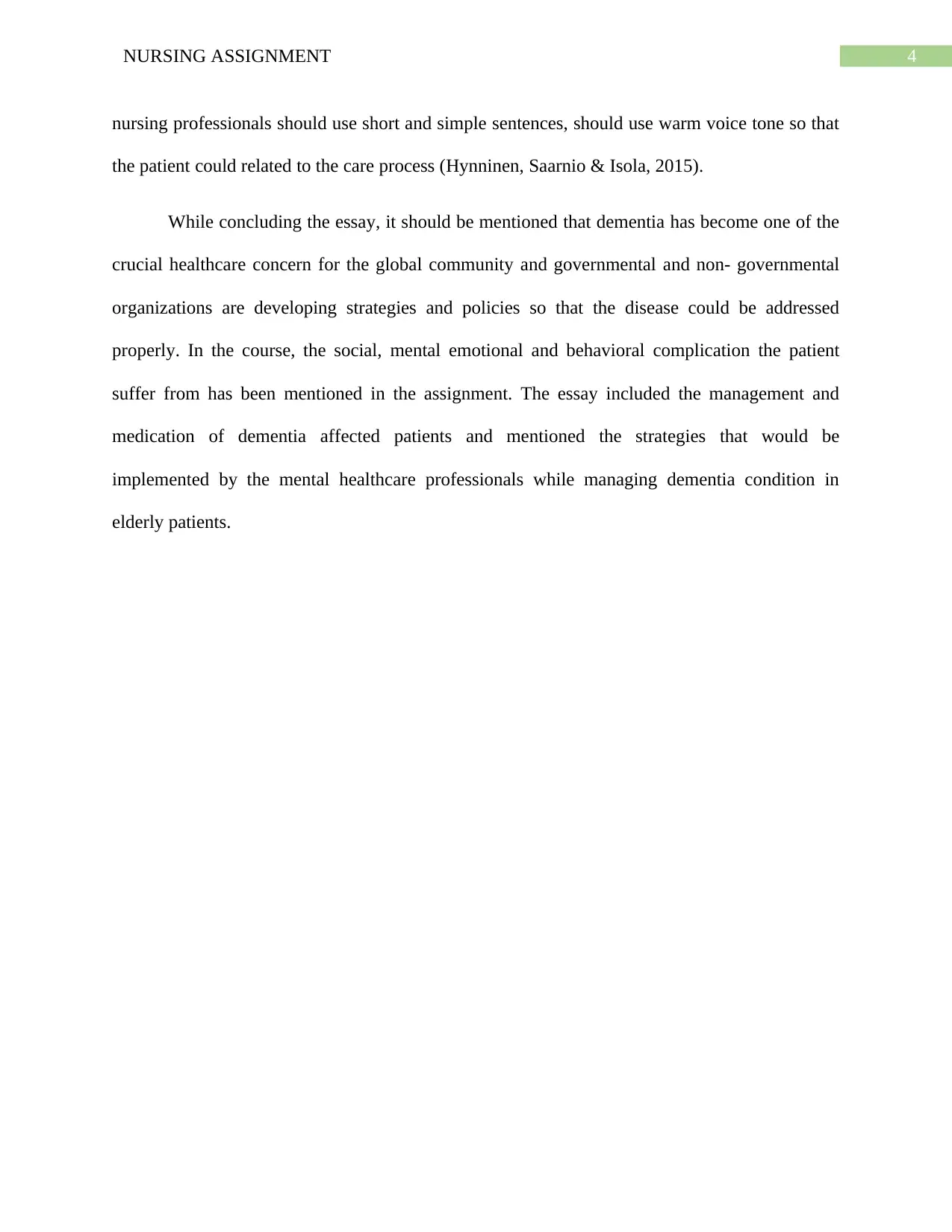
4NURSING ASSIGNMENT
nursing professionals should use short and simple sentences, should use warm voice tone so that
the patient could related to the care process (Hynninen, Saarnio & Isola, 2015).
While concluding the essay, it should be mentioned that dementia has become one of the
crucial healthcare concern for the global community and governmental and non- governmental
organizations are developing strategies and policies so that the disease could be addressed
properly. In the course, the social, mental emotional and behavioral complication the patient
suffer from has been mentioned in the assignment. The essay included the management and
medication of dementia affected patients and mentioned the strategies that would be
implemented by the mental healthcare professionals while managing dementia condition in
elderly patients.
nursing professionals should use short and simple sentences, should use warm voice tone so that
the patient could related to the care process (Hynninen, Saarnio & Isola, 2015).
While concluding the essay, it should be mentioned that dementia has become one of the
crucial healthcare concern for the global community and governmental and non- governmental
organizations are developing strategies and policies so that the disease could be addressed
properly. In the course, the social, mental emotional and behavioral complication the patient
suffer from has been mentioned in the assignment. The essay included the management and
medication of dementia affected patients and mentioned the strategies that would be
implemented by the mental healthcare professionals while managing dementia condition in
elderly patients.
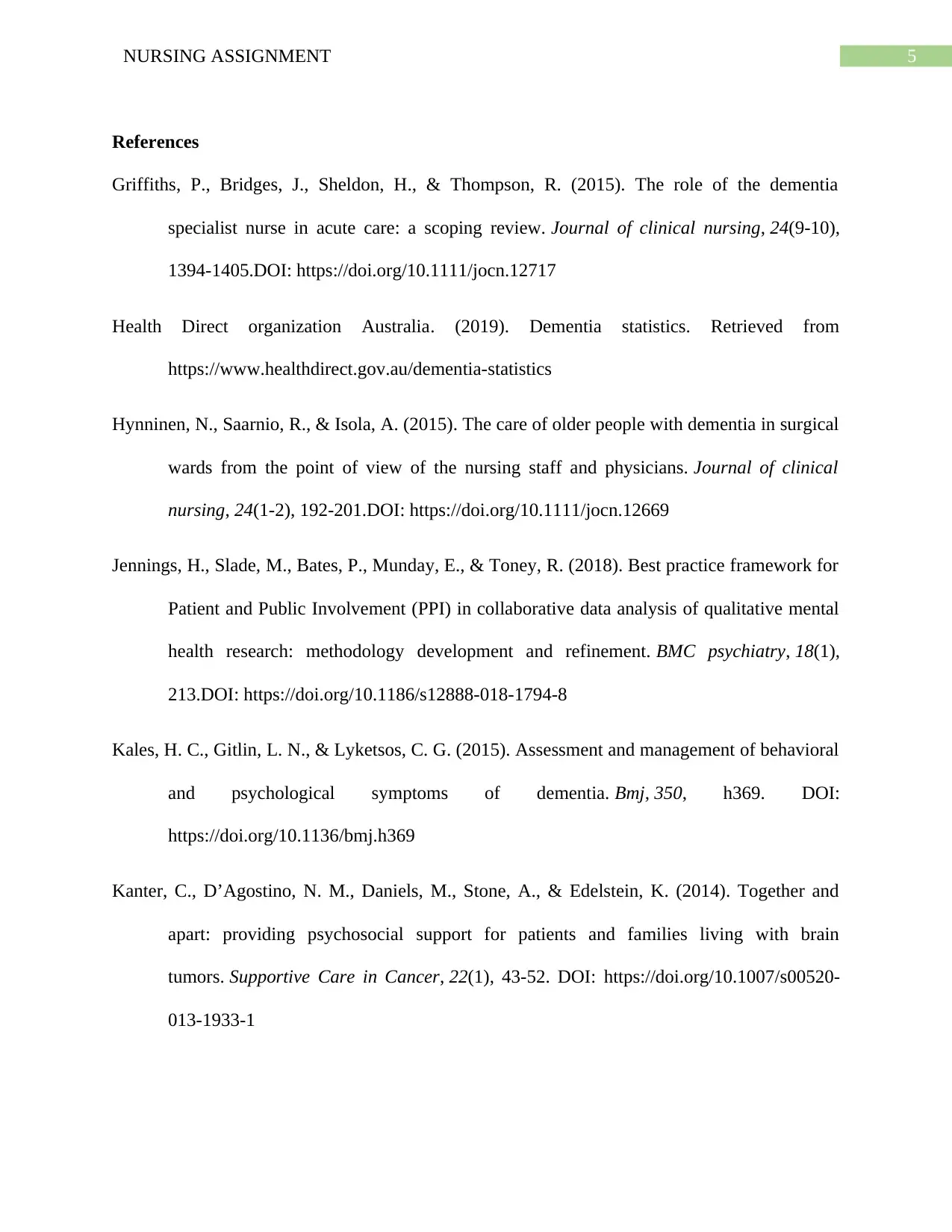
5NURSING ASSIGNMENT
References
Griffiths, P., Bridges, J., Sheldon, H., & Thompson, R. (2015). The role of the dementia
specialist nurse in acute care: a scoping review. Journal of clinical nursing, 24(9-10),
1394-1405.DOI: https://doi.org/10.1111/jocn.12717
Health Direct organization Australia. (2019). Dementia statistics. Retrieved from
https://www.healthdirect.gov.au/dementia-statistics
Hynninen, N., Saarnio, R., & Isola, A. (2015). The care of older people with dementia in surgical
wards from the point of view of the nursing staff and physicians. Journal of clinical
nursing, 24(1-2), 192-201.DOI: https://doi.org/10.1111/jocn.12669
Jennings, H., Slade, M., Bates, P., Munday, E., & Toney, R. (2018). Best practice framework for
Patient and Public Involvement (PPI) in collaborative data analysis of qualitative mental
health research: methodology development and refinement. BMC psychiatry, 18(1),
213.DOI: https://doi.org/10.1186/s12888-018-1794-8
Kales, H. C., Gitlin, L. N., & Lyketsos, C. G. (2015). Assessment and management of behavioral
and psychological symptoms of dementia. Bmj, 350, h369. DOI:
https://doi.org/10.1136/bmj.h369
Kanter, C., D’Agostino, N. M., Daniels, M., Stone, A., & Edelstein, K. (2014). Together and
apart: providing psychosocial support for patients and families living with brain
tumors. Supportive Care in Cancer, 22(1), 43-52. DOI: https://doi.org/10.1007/s00520-
013-1933-1
References
Griffiths, P., Bridges, J., Sheldon, H., & Thompson, R. (2015). The role of the dementia
specialist nurse in acute care: a scoping review. Journal of clinical nursing, 24(9-10),
1394-1405.DOI: https://doi.org/10.1111/jocn.12717
Health Direct organization Australia. (2019). Dementia statistics. Retrieved from
https://www.healthdirect.gov.au/dementia-statistics
Hynninen, N., Saarnio, R., & Isola, A. (2015). The care of older people with dementia in surgical
wards from the point of view of the nursing staff and physicians. Journal of clinical
nursing, 24(1-2), 192-201.DOI: https://doi.org/10.1111/jocn.12669
Jennings, H., Slade, M., Bates, P., Munday, E., & Toney, R. (2018). Best practice framework for
Patient and Public Involvement (PPI) in collaborative data analysis of qualitative mental
health research: methodology development and refinement. BMC psychiatry, 18(1),
213.DOI: https://doi.org/10.1186/s12888-018-1794-8
Kales, H. C., Gitlin, L. N., & Lyketsos, C. G. (2015). Assessment and management of behavioral
and psychological symptoms of dementia. Bmj, 350, h369. DOI:
https://doi.org/10.1136/bmj.h369
Kanter, C., D’Agostino, N. M., Daniels, M., Stone, A., & Edelstein, K. (2014). Together and
apart: providing psychosocial support for patients and families living with brain
tumors. Supportive Care in Cancer, 22(1), 43-52. DOI: https://doi.org/10.1007/s00520-
013-1933-1
⊘ This is a preview!⊘
Do you want full access?
Subscribe today to unlock all pages.

Trusted by 1+ million students worldwide
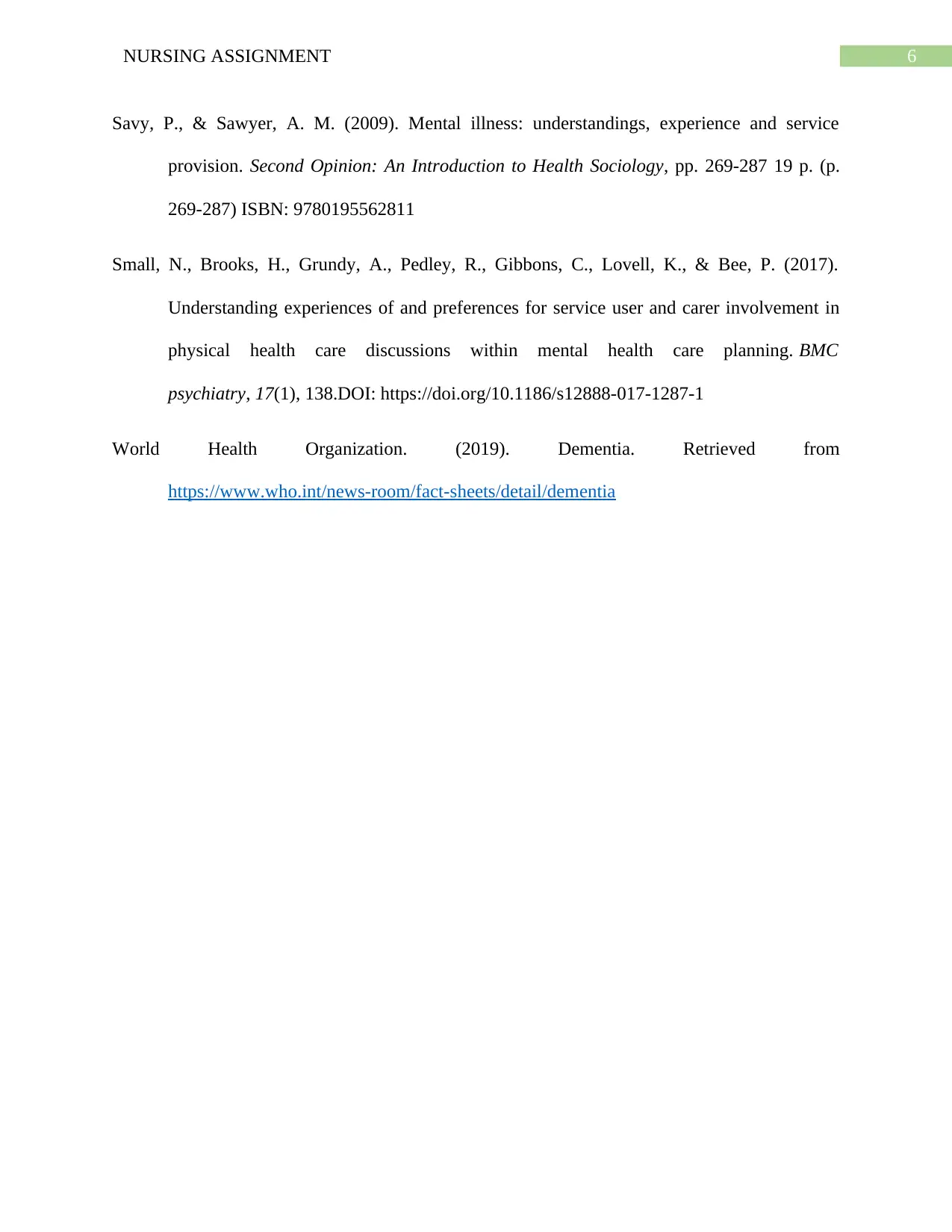
6NURSING ASSIGNMENT
Savy, P., & Sawyer, A. M. (2009). Mental illness: understandings, experience and service
provision. Second Opinion: An Introduction to Health Sociology, pp. 269-287 19 p. (p.
269-287) ISBN: 9780195562811
Small, N., Brooks, H., Grundy, A., Pedley, R., Gibbons, C., Lovell, K., & Bee, P. (2017).
Understanding experiences of and preferences for service user and carer involvement in
physical health care discussions within mental health care planning. BMC
psychiatry, 17(1), 138.DOI: https://doi.org/10.1186/s12888-017-1287-1
World Health Organization. (2019). Dementia. Retrieved from
https://www.who.int/news-room/fact-sheets/detail/dementia
Savy, P., & Sawyer, A. M. (2009). Mental illness: understandings, experience and service
provision. Second Opinion: An Introduction to Health Sociology, pp. 269-287 19 p. (p.
269-287) ISBN: 9780195562811
Small, N., Brooks, H., Grundy, A., Pedley, R., Gibbons, C., Lovell, K., & Bee, P. (2017).
Understanding experiences of and preferences for service user and carer involvement in
physical health care discussions within mental health care planning. BMC
psychiatry, 17(1), 138.DOI: https://doi.org/10.1186/s12888-017-1287-1
World Health Organization. (2019). Dementia. Retrieved from
https://www.who.int/news-room/fact-sheets/detail/dementia
1 out of 7
Related Documents
Your All-in-One AI-Powered Toolkit for Academic Success.
+13062052269
info@desklib.com
Available 24*7 on WhatsApp / Email
![[object Object]](/_next/static/media/star-bottom.7253800d.svg)
Unlock your academic potential
Copyright © 2020–2026 A2Z Services. All Rights Reserved. Developed and managed by ZUCOL.




